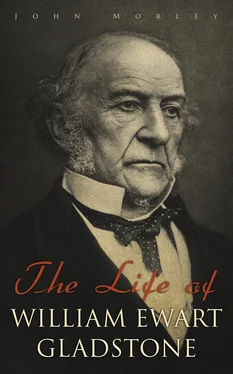ETON MISCELLANY
As for the Eton Miscellany , which was meant to follow earlier attempts in the same line, the best-natured critic cannot honestly count it dazzling. Such things rarely are; for youth, though the most adorable of our human stages, cannot yet have knowledge or practice enough, whether in life or books, to make either good prose or stirring verse, unless by a miracle of genius, and even that inspiration is but occasional. The Microcosm (1786-87) and the Etonian (1818), with such hands as Canning and Frere, Moultrie and Praed, were well enough. The newcomer was a long way behind these in the freshness, brilliance, daring, by which only such juvenile performances can either please or interest. George Selwyn and Gladstone were joint editors, and each provided pretty copious effusions. 'I cannot keep my temper,' he wrote afterwards in his diary in 1835, on turning over the Miscellany , 'in perusing my own (with few exceptions) execrable productions.' Certainly his contributions have no particular promise or savour, no hint of the strong pinions into which the half-fledged wings were in time to expand. Their motion, such as it is, must be pronounced mechanical; their phrase and cadence conventional. Even when sincere feelings were deeply stirred, the flight cannot be called high. The most moving public event in his schooldays was undoubtedly the death of Canning, and to Gladstone the stroke was almost personal. In September 1827 he tells his mother that he has for the first time visited Westminster Abbey,—his object, an eager pilgrimage to the newly tenanted grave of his hero, and in the Miscellany he pays a double tribute. In the prose we hear sonorous things about meridian splendour, premature extinction, and inscrutable wisdom; about falling, like his great master Pitt, a victim to his proud and exalted station; about being firm in principle and conciliatory in action, the friend of improvement and the enemy of innovation. Nor are the versified reflections in Westminster Abbey much more striking:—
Oft in the sculptured aisle and swelling dome,
The yawning grave hath given the proud a home;
Yet never welcomed from his bright career
A mightier victim than it welcomed here:
Again the tomb may yawn—again may death
Claim the last forfeit of departing breath;
Yet ne'er enshrine in slumber dark and deep
A nobler, loftier prey than where thine ashes sleep.
Excellent in feeling, to be sure; but as a trial of poetic delicacy or power, wanting the true note, and only worth recalling for an instant as we go.
As nearly always happens, it was less by school work or spoken addresses in juvenile debate, or early attempts in the great and difficult art of written composition, than by blithe and congenial comradeship that the mind of the young Gladstone was stimulated, opened, strengthened. In after days he commemorated among his friends George Selwyn, afterwards bishop of New Zealand and of Lichfield, 'a man whose character is summed up, from alpha to omega, in the single word, noble, and whose high office, in a large measure, it was to reintroduce among the anglican clergy the pure heroic type.' Another was Francis Doyle, 'whose genial character supplied a most pleasant introduction for his unquestionable poetic genius.' A third was James Milnes Gaskell, a youth endowed with precocious ripeness of political faculty, an enthusiast, and with a vivacious humour that enthusiasts often miss. Doyle said of him that his nurse must have lulled him to sleep by parliamentary reports, and his first cries on awaking in his cradle must have been 'hear, hear'! Proximity of rooms 'gave occasion or aid to the formation of another very valuable friendship, that with Gerald Wellesley, afterwards dean of Windsor, which lasted, to my great profit, for some sixty years, until that light was put out.' In Gaskell's room four or five of them would meet, and discuss without restraint the questions of politics that were too modern to be tolerated in public debate. Most of them were friendly to catholic emancipation, and to the steps by which Huskisson, supported by Canning, was cautiously treading in the path towards free trade. The brightest star in this cheerful constellation was the rare youth who, though his shining course was run in two-and-twenty years, yet in that scanty span was able to impress with his vigorous understanding and graceful imagination more than one of the loftiest minds of his time. 29Arthur Hallam was a couple of years younger than Gladstone, no narrow gulf at that age; but such was the sympathy of genius, such the affinities of intellectual interest and aspiration spoken and unspoken, such the charm and the power of the younger with the elder, that rapid instinct made them close comrades. They clubbed together their rolls and butter, and breakfasted in one another's rooms. Hallam was not strong enough for boating, so the more sinewy Gladstone used to scull him up to the Shallows, and he regarded this toilsome carrying of an idle passenger up stream as proof positive of no common value set upon his passenger's company. They took walks together, often to the monument of Gray, close by the churchyard of the elegy; arguing about the articles and the creeds; about Wordsworth, Byron, Shelley; about free will, for Hallam was precociously full of Jonathan Edwards; about politics, old and new, living and dead; about Pitt and Fox, and Canning and Peel, for Gladstone was a tory and Hallam pure whig. Hallam was described by Mr. Gladstone in his old age as one who 'enjoyed work, enjoyed society; and games which he did not enjoy he left contentedly aside. His temper was as sweet as his manners were winning. His conduct was without a spot or even a speck. He was that rare and blessed creature, anima naturaliter Christiana . He read largely, and though not superficial, yet with an extraordinary speed. He had no high or exclusive ways.' Thus, as so many have known in that happy dawn of life, before any of the imps of disorder and confusion have found their way into the garden, it was the most careless hours,—careless of all save truth and beauty,—that were the hours best filled.
ARTHUR HALLAM
Youth will commonly do anything rather than write letters, but the friendship of this pair stood even that test. The pages are redolent of a living taste for good books and serious thoughts, and amply redeemed from strain or affectation by touches of gay irony and the collegian's banter. Hallam applies to Gladstone Diomede's lines about Odysseus, of eager heart and spirit so manful in all manner of toils, as the only comrade whom a man would choose. 30But the Greek hero was no doubt a complex character, and the parallel is taken by Gladstone as an equivocal compliment. So Hallam begs him at any rate to accept the other description, how when he uttered his mighty voice from his chest, and words fell like flakes of snow in winter, then could no mortal man contend with Odysseus. 31As happy a forecast for the great orator of their generation, as when in 1829 he told Gladstone that Tennyson promised fair to be its greatest poet. Hallam's share in the correspondence reminds us of the friendship of two other Etonians ninety years before, of the letters and verses that Gray wrote to Richard West; there is the same literary sensibility, the same kindness, but there is what Gray and West felt not, the breath of a busy and changing age. Each of these two had the advantage of coming from a home where politics were not mere gossip about persons and paragraphs, but were matters of trained and continued interest. The son of one of the most eminent of the brilliant band of the whig writers of that day, Hallam passes glowing eulogies on the patriotism and wisdom of the whigs in coalescing with Canning against the bigotry of the king and the blunders of Wellington and Peel; he contrasts this famous crisis with a similar crisis in the early part of the reign of George III.; and observes how much higher all parties stood in the balance of disinterestedness and public virtue. He goes to the opera and finds Zucchelli admirable, Coradori divine. He wonders (1826) about Sir Walter's forthcoming life of Napoleon, how with his ultra principles Scott will manage to make a hero of the Corsican. He asks if Gladstone has read 'the new Vivian Grey ' (1827)—the second part of that amazing fiction into which an author, not much older than themselves and destined to strange historic relations with one of them, had the year before burst upon the world. Hallam is not without the graceful melancholy of youth, so different from that other melancholy of ripe years and the deepening twilight. Under all is the recurrent note of a grave refrain that fatal issues made pathetic.
Читать дальше









![William Frith - John Leech, His Life and Work. Vol. 1 [of 2]](/books/747171/william-frith-john-leech-his-life-and-work-vol-thumb.webp)


![William Frith - John Leech, His Life and Work, Vol. 2 [of 2]](/books/748201/william-frith-john-leech-his-life-and-work-vol-thumb.webp)